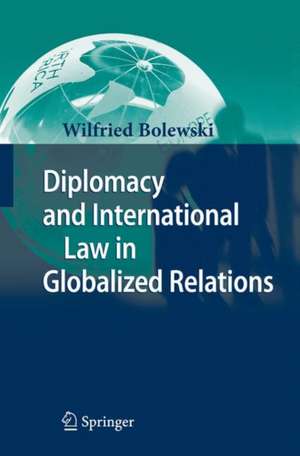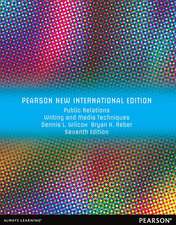Diplomacy and International Law in Globalized Relations
Autor Wilfried Bolewskien Limba Engleză Hardback – 17 apr 2007
With the strife for common values, the finality of international interactions moves beyond national interest towards communitarianism. International law governing foreign relations can be strengthened through judicial review by national courts.
Working on the interface of diplomacy and academia, this practitioner’s perspective combines an insider view into innovation and change of the diplomatic process with a concise interdisciplinary academic analysis.
| Toate formatele și edițiile | Preț | Express |
|---|---|---|
| Paperback (1) | 413.27 lei 6-8 săpt. | |
| Springer Berlin, Heidelberg – 15 oct 2010 | 413.27 lei 6-8 săpt. | |
| Hardback (1) | 387.96 lei 6-8 săpt. | |
| Springer Berlin, Heidelberg – 17 apr 2007 | 387.96 lei 6-8 săpt. |
Preț: 387.96 lei
Nou
Puncte Express: 582
Preț estimativ în valută:
74.26€ • 80.69$ • 62.42£
74.26€ • 80.69$ • 62.42£
Carte tipărită la comandă
Livrare economică 21 aprilie-05 mai
Preluare comenzi: 021 569.72.76
Specificații
ISBN-13: 9783540711001
ISBN-10: 3540711007
Pagini: 156
Ilustrații: VI, 147 p.
Dimensiuni: 155 x 235 x 14 mm
Greutate: 0.41 kg
Ediția:2007
Editura: Springer Berlin, Heidelberg
Colecția Springer
Locul publicării:Berlin, Heidelberg, Germany
ISBN-10: 3540711007
Pagini: 156
Ilustrații: VI, 147 p.
Dimensiuni: 155 x 235 x 14 mm
Greutate: 0.41 kg
Ediția:2007
Editura: Springer Berlin, Heidelberg
Colecția Springer
Locul publicării:Berlin, Heidelberg, Germany
Public țintă
Professional/practitionerCuprins
Germany.- Introduction: Practitioner’s perspective of diplomacy.- Essentials of modern diplomacy.- Diplomacy between statecraft and social science.- Internalization of diplomacy or internationalization of domestic policy.- From national to European Foreign Service.- Symbolism and ritual in multilateral diplomacy.- Flexibility and pragmatism as response to global challenges.- Reciprocity versus communitarianism.- Transformation of globalized relations and its impact on diplomacy.- New participants and corporate diplomacy: symbiosis of diplomacy and transnational companies.- Citizen diplomats and public relations diplomacy: popularization of diplomacy.- Towards a diplomatic corporate identity?.- The importance of an international diplomatic culture.- The relevance of language.- Globalized relations and the law.- Private authority in transnational relations.- Transnational regime as soft law.- Judicial review of governmental diplomacy.
Textul de pe ultima copertă
Diplomacy is transforming and expanding its role as the method of interstate relations to a general instrument of communication among globalized societies. Adapting to globalization the practice of diplomacy is shared by non-state participants, thus becoming privatized and popularized.
With the strife for common values, the finality of international interactions moves beyond national interest towards communitarianism. International law governing foreign relations can be strengthened through judicial review by national courts.
Working on the interface of diplomacy and academia, this practitioner’s perspective combines an insider view into innovation and change of the diplomatic process with a concise interdisciplinary academic analysis.
"The art of diplomacy has thoroughly changed in the age of globalization. Foreign policy is no longer the domain of relations among states, but is practiced by international organizations, transnational companies, and non-governmental organizations alike. This book explores the changing role of diplomacy in a globalizing world. It serves as an eye opener for anybody interested in the practice of international negotiations, written by one of the most experienced senior diplomats of the German foreign service."
Professor Thomas Risse, Freie Universität Berlin
"Ambassador Bolewski's book is a wide-ranging and highly accessible overview, informed by the diplomatic studies literature and many years of experience as a diplomat. His analysis is proof of the fact that practitioners can make a disctinctive contribution to this emerging field, and that the author has a keen eye for new developments in diplomatic practice."
Professor Jan Melissen, Netherlands Institute of International Relations, Antwerp University, and Co-Editor of The Hague Journal of Diplomacy
With the strife for common values, the finality of international interactions moves beyond national interest towards communitarianism. International law governing foreign relations can be strengthened through judicial review by national courts.
Working on the interface of diplomacy and academia, this practitioner’s perspective combines an insider view into innovation and change of the diplomatic process with a concise interdisciplinary academic analysis.
"The art of diplomacy has thoroughly changed in the age of globalization. Foreign policy is no longer the domain of relations among states, but is practiced by international organizations, transnational companies, and non-governmental organizations alike. This book explores the changing role of diplomacy in a globalizing world. It serves as an eye opener for anybody interested in the practice of international negotiations, written by one of the most experienced senior diplomats of the German foreign service."
Professor Thomas Risse, Freie Universität Berlin
"Ambassador Bolewski's book is a wide-ranging and highly accessible overview, informed by the diplomatic studies literature and many years of experience as a diplomat. His analysis is proof of the fact that practitioners can make a disctinctive contribution to this emerging field, and that the author has a keen eye for new developments in diplomatic practice."
Professor Jan Melissen, Netherlands Institute of International Relations, Antwerp University, and Co-Editor of The Hague Journal of Diplomacy
Caracteristici
Comprehensive understanding of the widening scope of public as well as private diplomacy and its normative framework Practitioner’s inside view of diplomacy combined with interdisciplinary academic analysis Recommended by Prof. Jan Melissen, Netherlands Institute of International Relations "Clingendael" and Prof. Thomas Risse, Free University Berlin/Harvard University Includes supplementary material: sn.pub/extras
















